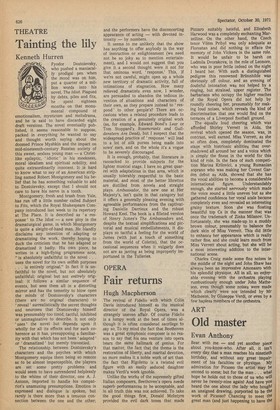Tainting the lily
Kenneth Hurren
Fyodor Dostoievsky, who pushed a maniacally prodigal pen when the mood was on him, put a quarter of a million words into his novel, The Idiot. Plagued by debts, piles and fits, he spent eighteen months on that monumental compound of emotionalism, mysticism and melodrama, and he is said to have discarded eight draft versions. The novel eventually published, it seems reasonable to suppose, packed in everything he wanted to say and thought worth saying about the doomed Prince Myshkin and the impact on mid-nineteenth-century Russian society of this sweet, sexless young man — a Christlike epileptic, 'idiotic ' in his meekness, moral idealism and spiritual nobility, and quite extraordinarily innocent. It is hard to know what to say of an American stripling named Robert Montgomery and his belief that he has something valuable to add to Dostoievsky, except that I should not care to have his nerve in a tooth.
Montgomery, fresh and brash from Yale, has run off a little number called Subject to Fits, which the Royal Shakespeare Company introduced last week to its repertory at The Place. It is described as 'a response' to The Idiot — a new ploy in the dramaturgical game, in which Montgomery is quite a sleight-of-hand man. He blandly disclaims any intention of adapting or dramatizing the work, thereby hoping to duck the criticism that he has adapted or dramatized it badly. His own piece, he writes in a high-flying programme note, "is absolutely unfaithful to the novel . . . uses the novel for its own selfish purposes . . is entirely original." In fact it is unfaithful to the novel, but not absolutely unfaithful; original but not entirely original: it follows a similar sequence of events, but sees them all in a distorting mirror and has the temerity to blow open the minds of Dostoievsky's characters (there are no original characters) to ' reveal ' surrealistically the secret thoughts and neuroses that Dostoievsky himself was presumably too timid, tactful, inhibited or unimaginative to describe. It not only ' uses ' the novel but depends upon it wholly for all its effects and for such coherence as it has, presupposing a familiarity with that which has not been ' adapted ' or ' dramatized ' but merely travestied.
The relationship between Dostoievsky's characters and the psyches with which Montgomery equips them being so remote as to be almost imperceptible, the players are set some pretty problems and would seem to have surrendered helplessly to the whims of their director, one A. J. Antoon, imported to handle his compat riot's unamusing presumptions. Emotion is expressed and dialogue is spoken, but rarely is there more than a tenuous connection between the one and the other; and the performers have the disconcerting appearance of acting — with devoted intensity — by numbers.
It seems to me unlikely that the show has anything to offer anybody in the way of instruction or enlightenment (we need not be so joky as to mention entertainment), and I would not suggest that you give it a second thought were it not for that ominous word, 'response.' This, if we're not careful, might open up a whole new territory of dramatic activity, full of intimations of stagnation. How many relieved dramatists even now, I wonder, are persuaded to abandon the tedious invention of situations and characters of their own, as they prepare instead to ' respond' to other people's? There are occasions when a related procedure leads to the creation of a genuinely original work (as, for example, Edward Bond's Lear or Tom Stoppard's Rosenorantz and Guildenstern Are Dead), but I suspect that the widespread practice of ' response' will lead to a lot of silk purses being made into sows' ears, and on the whole it's a vogue to be severely discouraged.
It is enough, probably, that literature is ransacked to provide subjects for the lighter musical stage. I have no great quarrel with adaptations in that area, which is usually tolerably respectful to the basic material, and most of the better librettos are distilled from novels and straight plays. Ambassador, the new one at Her Majesty's, Isn't quite in that category but it offers a generally pleasing evening with agreeable performances from the captivating Danielle Darrieux and the robust Howard Keel. The book is a filleted version of Henry James's The Ambassadors and, despite the textual simplifications and pictorial and musical embellishments, it displays so tactful a feeling for the world of James (with just a touch of something from the world of Colette), that the occasional sequences when it vulgarly does not are as jarring as being improperly importuned in the Tuileries.


































 Previous page
Previous page